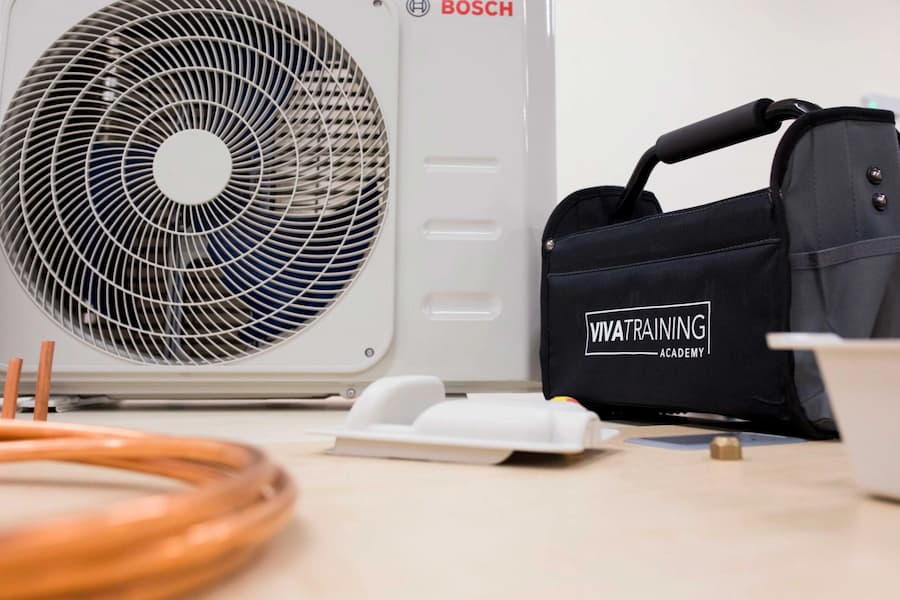
The UK has implemented regulations to protect the environment from ozone-depleting substances and fluorinated greenhouse gases (F-Gases). The F-Gas Regulation and the Ozone-Depleting Substances and Fluorinated Greenhouse Gases (Amendment etc.) (EU Exit) Regulations 2019 are two of the critical pieces of legislation that cover the use of F-Gases in the UK.
We provide an overview of what the regulations cover, who needs to complete F-Gas Training, and what requirements must be met.
What the Regulations Cover
The F-Gas Regulation is an EU legislation incorporated into UK law. It aims to reduce the use of F-Gases and their impact on the environment by banning specific high global warming potential (GWP) HFCs and phasing out their use over time. The regulation also restricts the number of F-Gases used in equipment and requires keeping a record of all F-Gas installations.
The Ozone-Depleting Substances and Fluorinated Greenhouse Gases (Amendment etc.) (EU Exit) Regulations 2019 are UK-specific legislation that further strengthens F-Gases’ control by introducing new duties for companies and individuals with F-Gases. This includes bans on certain high GWP HFCs and restrictions on how much F-Gases can be used in equipment.
Who Needs F-Gas Training
The regulations require companies or individuals working on equipment that contains or uses fluorinated gases, as well as those involved in the sale, supply, installation, repair, maintenance or disposal of such equipment, to complete F-Gas Training. This includes refrigeration, air conditioning and heat pump engineers (RACHP).
Requirements for F-Gas Training
The requirements for F-Gas Training are outlined in the F-Gas Regulation. All RACHP engineers must complete courses covering safe handling, use and recovery of fluorinated gases and leak detection and prevention. To be qualified to do this work, they must obtain qualifications from an approved training provider.
The qualifications vary depending on the type of work being undertaken. For example, engineers who work on systems containing more than 3kg of HFCs must obtain Category 1 certification. Those who work on systems containing less than 3kg of HFCs must have Category 2 certification.
F-Gas Training Courses
The F-Gas category 1 certification course is the most common, which covers all aspects of working with fluorinated gases, including handling, safe use, recovery and leak prevention.
F-Gas Category 1 Covers:
Refrigeration, air conditioning and heat pump (RACHP) engineers need to complete F-Gas certification in four different categories, depending on the type of activity being carried out, the appliances they need to work on and the level their working too.
Category 1 (Level 3): Installation, maintenance, service, recovery, decommissioning and leakage checking of refrigerant systems of any size, plus Categories 2 – 4.
Category 2 (Level 3): Installation, maintenance, service, recovery, decommissioning and leakage checking of refrigerant systems with a charge of less than 3kg (6kg if hermetically sealed).
Category 3 (Level 2): Refrigerant recovery from systems that contain less than 3kg of F-Gas.
Category 4 (Level 2): Checking for leaks and identifying leakage risk in refrigerant systems, including air conditioning units and heat pumps.
F-Gas certification must be renewed every five years.
F-Gas Category 1 Certification FAQs:
Q: What is F-Gas Category 1 certification?
F-Gas Category 1 certification is a legally required qualification for anyone who works with fluorinated greenhouse gases, such as HFCs. It requires that the technician has undergone relevant training and holds an up-to-date certificate of competence.
Q: Who needs to have this certification?
All individuals working with equipment containing or designed to contain fluorinated greenhouse gases must hold a valid F Gas category 1 certificate to comply with legislation. This includes those working on stationary refrigeration, air conditioning and heat pump systems that contain more than 3kg of HFCs.
Q: How do I obtain my certificate?
You must complete an approved course from an accredited training provider to obtain your certificate, followed by a written examination. Once you have successfully passed the exam, you can apply for your Certificate of Competence, which will be issued by Refcom (the UK’s recognised body for registering technicians).
Q: How do I get F-Gas certified?
To become certified, you must complete a training course covering all the legislation related to handling fluorinated greenhouse gases. The course should be approved by your local government or agency responsible for regulating this activity. After completing the training, you will need to pass an exam that tests your understanding of the material presented in the course. Once you have passed the exam, you will receive your F-Gas Category 1 Certificate.
Recap
F-Gas Training is essential for anyone who works with fluorinated gases in the UK. The requirements for F-Gas Training are outlined in the F-Gas Regulation. They include courses covering safe handling, use and recovery of fluorinated gases and leak detection and prevention.
The benefits of completing an approved training course include gaining knowledge and qualifications that will allow you to safely work with fluorinated gases while complying with all relevant regulations.
Related Articles
- F-Gas Regulations and their Impact on the HVAC-R Market
- F-Gas Training Requirements
- F-Gas Course FAQs
- What are F-Gas Regulations
- Understanding F-Gases

